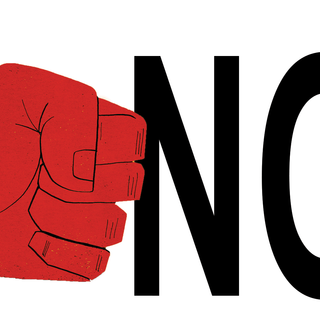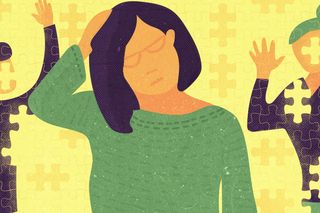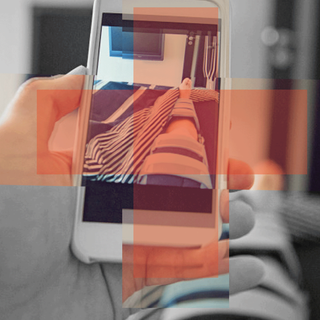
Is This Normal? “I Can’t Remember Names or Faces.”
Some developing brains might sacrifice facial recognition skills for reading skills.

In this series, we dig into our strange phobias, fixations, and neuroses, and ask ourselves — Is This Normal?
A couple of months ago, I was shopping in my neighborhood store when someone hailed me by name. “Hi! How are you?” they said, leaning in to hug me, before asking me a personal question about my husband that showed familiarity with my life.
I had no idea who this person was.
“Oh, hi … you!” I enthused, while privately weighing them up for stalker vibes and hidden knives. I saw none — just a friendly smile. “It’s been so long! How have you been?” We then proceeded to have a 10-minute conversation touching on some lightly personal topics. It wasn’t until the end that I got a glimmer of who the person might be from the context of their questions. I still hadn’t recognized their face; their name was a hopeless dream. In my mind, I only had the vague impression of a previous brush with a blue dress at a friend’s dinner party.
In case you’re wondering why, when a seeming stranger asked me a personal question, I didn’t kick them in the shins and run away, it’s because I’m terrible with remembering faces. And names. So terrible that I’ve taken to saying, “Nice to see you,” instead of “Nice to meet you,” because I’ve learned the hard way that, too often, I have actually met them before. And conversed at length.
It’s a problem. But is it a normal problem?
In recent years, there has been a growing acknowledgement that facial memory skills exist on a spectrum.
“Virtually every psychologist nowadays would say all kinds of cognitive abilities, like reading and maths and so on, are distributed on a continuum,” Richard Cook, a psychology lecturer at City University London, told Quartz in 2016. “And face recognition is no different.”
Cook’s area of expertise lies in prosopagnosia, or face blindness, a cognitive disorder affecting one’s ability to recognize faces. While it used to be thought extremely rare, scientists now believe some degree of developmental prosopagnosia (as opposed to facial blindness brought about by brain injury, as from a stroke) affects as many as one in 50 people. The condition generally affects nothing else — neither IQ, nor overall memory are impaired — but people with the most severe form have trouble recognizing even their own face. More mild forms exist, described as akin to dyslexia, but with difficulty in recognizing faces, rather than words.
That said, there’s a theory, backed by brain scan research, that suggests a link between the development of facial recognition and the development of reading skills — namely, that the brain develops letter- and word-recognition skills in specific neural spots that can end up ‘crowding out’ the further development of facial recognition skills. The researchers behind this theory suggest the solution to ensuring children develop both strong reading skills and strong facial recognition skills might lie in timing of education — that is, taking advantage more precisely of the brain’s youthful plasticity. For instance, they suggest we may need to check our obsession with early reading, writing in the conclusion of one supporting study that scanned the brains of 10 6-year-old children before and during their first year of school to see how learning to read affected the brain’s structure for facial processing: “Our results might also explain why numerous academic curricula, even in ancient civilizations, propose to teach reading around 7 years.”
I may or may not have some type of developmental prosopagnosia. I’ve taken an online facial recognition test and scored quite highly, but let’s be honest — online tests aren’t that reliable. I do know, however, that I was an early reader and have always had above average verbal skills, which isn’t unrelated to me becoming a writer as an adult. Did my brain make a trade-off somewhere along the way? It’s entirely possible. It also seems that, if it did, it’s entirely normal.
Oh, and as for my inability to remember names, it turns out there are a couple of simpler explanations for that. One is the ‘next-in-line’ effect, in which we try to take in multiple new pieces of information (names) but are simultaneously distracted by anticipation of the next piece of information (the next person’s name, or the introduction of ourselves). “As it turns out, we can either take in and store information, or get ready for the next grouping of information. Since we try to do two things at once, we fail at both,” Esther Inglis-Arkell writes for i09.
On top of this, the information we’re trying to take in — names — happens to be fairly meaningless. A name “is both completely arbitrary and somewhat familiar (for common names) and ends up neither connecting to what you already know nor standing out as unusual,” Northwestern University psychology professor Paul Reber told The Atlantic. “So you get this funny phenomenon where you can remember lots about a person you recently met — everything except their name (this happens to me all the time).”
And without a face to connect the name to, it may become even more difficult to hold in your head.
Liesl Goecker is The Swaddle's managing editor.
Related


The Buzz Cut: People Are Faking Diseases to Scam Sympathizers Online
